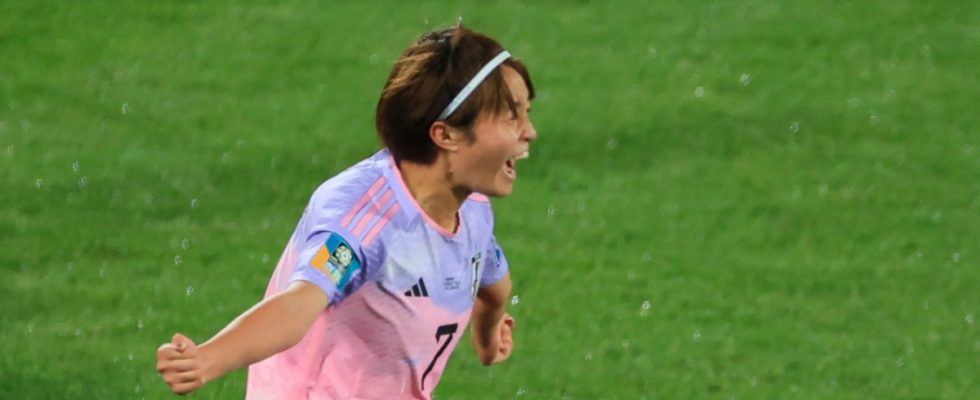Hinata Miyazawa appeared at the press conference without her trademark. The headband she wears on the pitch pays homage to Nahomi Kawasumi – now 37-years-old wearing a headband – who rose to prominence in Japan in the 2011 World Cup semi-finals when she scored two goals in Germany’s 3-1 win against Sweden paved the way for the World Cup and the country’s great soccer boom, which inspired young girls like Miyazawa (then aged 12). Miyazawa once said she used to run after her big brother with a soccer ball, and since she was a child she wanted to use the hairband to express her admiration for the old heroines with whom she is now compared.
After beating Norway in the round of 16, however, she has long since left Kawasumi behind: Japan’s surprising goalscorer has already scored five goals, that’s as many as wonder striker Homare Sawa in the entire tournament in 2011 and enough to currently lead the goalscoring list. A shy smile escaped after the game when asked about it, but at her second consecutive press conference as the game’s player, Miyazawa continued to appear very reserved.
She was “very happy” that she had set the record, she said – followed by an almost courageous announcement by Japanese standards: “I didn’t expect that we would get this far. But now that I’m here, I want to I would like to meet more often.”
Japan beat Norway 3-1 in Wellington in the second round of 16 of the World Cup, with an own goal and goals from Risa Shimizu and Miyazawa. And gradually they too have to accept that they have exchanged status as secret favorites for that of real favourites. 5-0 against Zambia, 2-0 against Costa Rica, 4-0 against Spain and now, despite conceding the first goal to make it 1-1 by Guro Riding, a clear win over the Norwegians – that’s a record that the rest of the field has long enjoyed scares Japan and its incredible adaptability.
The team is very young: the only player over 30 is central defender Saki Kumaga
While most other teams have decided on a style before the tournament, Japan coach Futoshi Ikeda thinks something new for each opponent. Best example: On Monday, the Japanese defeated Spain with just 20 percent possession with four quick counterattacks – they beat Norway with almost 60 percent control. What could be seen in both games were the dangerous interface passes and the ice-cold shots in front of the goal, like that of Miyazawa in the 3-1. Japan proves that you can win with or without the ball.
“I suspected they would take the ball, but respect to Japan for that performance,” said Norway coach Heege Riise. The opponents are really enthusiastic about the performance of the Japanese women, the Spaniards were already very respectful, and now the Norwegians are too.
“They are very disciplined and very structured in the way they play in attack and defence. They have so much quality in front of goal that they don’t need a lot of chances. I think they have a lot of strengths to play on, and they have shown that they can do that against different types of teams,” said winger Caroline Graham Hansen, who was supposed to organize the offensive in the absence of the still ailing Ada Hegerberg – but repeatedly failed because of the Japanese back four.
Japan’s tactics are working – that’s also the performance of the coach
Japan’s adaptation tactics are also surprising in that one of the youngest teams in the World Cup has settled outside of Christchurch. The only player over 30 in the squad is central defender Saki Kumagai, who became world champion in 2011 and until recently played for FC Bayern. Victory at the U20 World Cup in 2018 and runners-up in 2022 were already signs that another strong generation was emerging after the 2011 World Cup title, and now Miyazawa and players like Manchester City’s Yui Hasegawa are proving it.
However, it is also the manager’s performance that is generating a lot of much-needed interest in the country, as the professional league, which started two years ago, has not yet become the TV hit that it should be. Futoshi Ikeda has made a name for himself as someone who, on the one hand, knows how to form a unit and attaches great importance to building good relationships with his players. He is also a big supporter of said opponent analysis, about which he is reluctant to reveal more details in press conferences.
When asked about Hansen’s lengthy praise, Ikeda thanked him and agreed that his team “gets more and more confident as the tournament progresses” as the tactics work. He liked to talk about his own, explaining in detail the division of space in the second half, but with regard to the opponents, according to Ikeda, just think “step by step from game to game”. A well-known phrase, which is surprisingly true in the case of the adaptable Japanese women.

